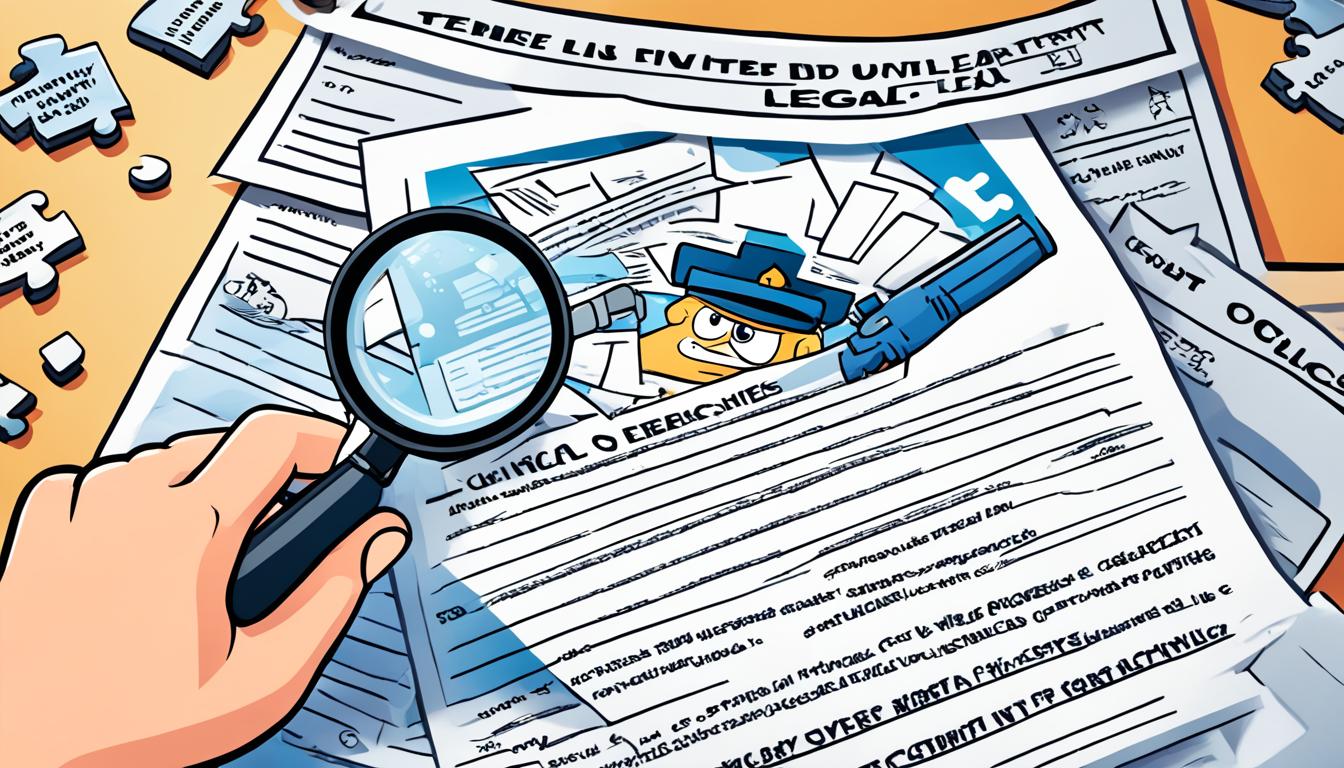Did you know that an arrest warrant is an official document that authorizes a police officer to arrest a specific individual based on probable cause1? This surprising fact highlights the significant impact an arrest warrant can have on someone’s life. Whether you’re facing the possibility of an arrest warrant or simply curious about the legal process, understanding the background information surrounding arrest warrants is essential.
Arrest warrants are not issued lightly. They require a written affidavit that presents factual information1to establish the involvement of the person named in the warrant. This affidavit may include hearsay information gathered from multiple sources like other officers, documents, forensic examinations, expert analysis, witnesses, victims, and the affiant’s training and experience1.
To obtain an arrest warrant, a police officer must go through a meticulous process. They submit a written affidavit under oath to a judge or magistrate, who carefully reviews the evidence to ensure probable cause exists2. Probable cause is defined as a reasonable belief, based on factual information, that a person has committed a crime2. Once a judge approves the warrant, the officer is authorized to make an arrest.
The contents of an arrest warrant are crucial. The warrant specifies the crime for which the arrest is authorized and may include restrictions on the manner of arrest and bail requirements1. It is important to remember that an arrest warrant is an allegation made by a police officer and does not imply guilt. In the criminal justice system, defendants have the right to legal representation and the opportunity to present evidence in their defense2.
Key Takeaways:
- An arrest warrant is an official document that authorizes a police officer to arrest a specific individual based on probable cause.
- Obtaining an arrest warrant requires a written affidavit presenting factual information to establish the individual’s involvement.
- Probable cause is defined as a reasonable belief, based on factual information, that a person has committed a crime.
- An arrest warrant is an allegation and does not imply guilt.
- Defendants have the right to legal representation and the opportunity to present evidence in their defense.
Understanding Arrest Warrants
An arrest warrant is an essential legal document that grants police officers the authority to arrest individuals suspected of committing a crime. It is the result of a thorough process that involves presenting evidence to a judge or magistrate to establish probable cause for the suspect’s involvement. This section explores the key aspects of arrest warrants, including the role of probable cause, the significance of affidavits, and the involvement of judges in the issuance of warrants.
When a police officer suspects an individual’s involvement in a crime, they must present their case to a judge or magistrate. This is done through a written affidavit that outlines the factual information and evidence supporting probable cause3. The affidavit must establish that there is a reasonable belief that a crime has been committed and that the named person is responsible for it. The judge assesses the credibility of the affidavit and, if satisfied with the evidence presented, grants the arrest warrant. The warrant serves as official authorization for law enforcement to apprehend the individual4.
Arrest warrants typically identify the specific crime for which the arrest is authorized and may specify the manner in which the arrest can be conducted. Some arrest warrants also include information on the bail amount required for the defendant’s release after arrest3. It is important to note that a generic description that could apply to multiple individuals is not sufficient to establish probable cause for an arrest warrant issuance3. The affidavit must provide specific details linking the suspect to the alleged crime.
While the arrest warrant process is designed to be thorough, mistakes can occur. Misspelling the suspect’s name or specifying the wrong crime are examples of common errors3. When executing an arrest warrant, police officers are advised to show the warrant to the suspect and correct any identity errors if proven3. However, in certain situations, such as safety concerns or ongoing investigations, suspects may not be immediately shown the warrant3.
It is essential to understand that clerical errors in warrants are not enough to invalidate them3. The validity of an arrest warrant is determined by the content and process followed in obtaining it, rather than minor errors that can occur during document preparation.
| Key Points |
|---|
| An arrest warrant authorizes police officers to arrest individuals suspected of committing a crime3. |
| Police officers submit a written affidavit to a judge or magistrate, demonstrating probable cause for the suspect’s involvement3. |
| Arrest warrants usually specify the crime and may include details on bail3. |
| Mistakes in arrest warrants, such as misspellings or incorrect crime specification, can occur but do not invalidate the warrant3. |
The Basics of Warrant Applications
When seeking a warrant, it is crucial to understand the constitutional requirements and rules of criminal procedure that govern the application process. Warrant applications must comply with constitutional standards, ensuring the protection of individual rights while allowing for lawful searches and arrests.5
The most crucial constitutional requirement is establishing probable cause, which requires sufficient evidence to believe that a crime has been committed and the person named in the warrant is involved. This standard ensures that warrants are not issued based on mere suspicion or arbitrary decision-making. The information provided in the warrant application must be carefully crafted to satisfy the probable cause threshold.3
Another critical element of warrant applications is particularity. Warrants must describe with specificity the places to be searched and the items to be seized. This requirement prevents general or unrestricted searches, protecting individuals from unwarranted intrusion. The level of detail required in the application varies depending on the jurisdiction and the nature of the investigation.5
Affidavits accompany warrant applications and play a crucial role in convincing the court that there is sufficient evidence to establish probable cause. These sworn statements provide the factual basis for the warrant application and present the information that justifies the search or arrest. It is important to note that not all information known to the affiant needs to be included in the affidavit. Instead, the affiant should focus on including factual information that establishes the required probable cause.6
While warrant applications must meet specific legal requirements, it is essential to seek guidance from legal professionals familiar with the rules of criminal procedure in the relevant jurisdiction. These professionals can provide invaluable assistance in crafting compelling warrant applications that meet all the necessary constitutional and procedural standards.3
Proper Affidavit Construction
In addition to meeting constitutional and procedural requirements, the construction of the affidavit itself is crucial to the success of a warrant application. Affiants must ensure that the information presented in the affidavit is accurate, reliable, and admissible in court.3
Affiants should also be aware of potential mistakes that can undermine the validity of the warrant application. Common errors include misspelled names, incorrect crime specifications, or incomplete information. It is crucial to verify all information before submitting the warrant application to avoid unnecessary complications and ensure the integrity of the legal process.3
By understanding the basics of warrant applications and working closely with legal professionals, individuals involved in the criminal justice system can navigate the complexities of the application process and ensure compliance with constitutional requirements and rules of criminal procedure. Properly crafted warrant applications increase the likelihood of obtaining a warrant and conducting a lawful search or arrest, safeguarding both individual rights and the integrity of the legal system.3
| Types of Warrants | Description |
|---|---|
| Arrest Warrant | An official document signed by a judge or magistrate that authorizes a police officer to arrest a specific person. It typically includes details of the crime, restrictions on arrest, and bail conditions.3 |
| Search Warrant | A legal document issued by a judge that permits law enforcement to search specific locations connected to a crime. It outlines the places to be searched and the items to be seized.5 |
| Bench Warrant | Issued when a subject fails to appear for a required court appearance.6 |
| Civil Capias Warrant | A special apprehension order in civil court cases where the defendant repeatedly fails to comply with judge’s orders.6 |
| Fugitive Warrant | Issued when a suspect from another state is believed to be in the local jurisdiction.6 |
| Governor’s Warrant | Issued to arrest and transport suspects who have committed crimes in another state back to that state.6 |
| Capias Warrant | Issued when a subject has a guilty judgment and fails to pay a fine or complete specified conditions within the required time period.6 |
| Alias Warrant | Issued when a subject fails to appear in court for a scheduled court date before any plea has been entered.6 |
Building an Impressive Affidavit
When constructing an affidavit, it is essential to follow a structured approach that highlights the necessary elements and ensures a compelling presentation of the case. By understanding the offense elements, analyzing probable cause, and leveraging training and experience, you can create a powerful legal document.
Identifying Offense Elements1
The first step in building an impressive affidavit is to identify the offense elements. These elements constitute the essential components that establish a crime has been committed. Carefully evaluate the available evidence and verify its ability to support each element1. This ensures that your affidavit is grounded in solid factual information.
Probable Cause Assessment127
Probable cause plays a significant role in any warrant application. It requires a fair probability, taking into account all the facts and circumstances presented in the affidavit1. Assessing probable cause involves considering the training and experience of those involved1. By conducting a thorough analysis, you can establish a strong foundation for your affidavit and increase its credibility.
Furthermore, it is crucial to understand that probable cause does not necessitate proof beyond a reasonable doubt2. Instead, it serves as a basis for the judge or magistrate to authorize an arrest or search warrant. Remain diligent in ensuring that your presentation of probable cause is compelling and convincing based on the available information127.
Structured Affidavit Format1
A well-structured affidavit is essential for clarity and consistency. To achieve this, adhere to the court’s specifications by numbering and formatting paragraphs appropriately1. The standard structure of an affidavit typically includes sections such as the affiant’s information, statutory violations, purpose, overview of the investigation, probable cause statement, limited presentation of facts, definitions where necessary, facts supporting elements of the offense, and a conclusion stating the request1.
Utilizing Standard Language and Specialized Information1
Affidavits often contain “boilerplate” language that can be reused, saving time and effort1. However, it is crucial to customize the content for particular types of cases, such as computer searches, child pornography investigations, and complex fraud cases1. By incorporating specialized information, you enhance the relevancy and impact of your affidavit.
Attributing Facts to Sources1
Affidavits must present facts accurately and attribute them to their sources, especially when utilizing information from informants1. Carefully consider including information discrediting sources in consultation with the prosecutor to maintain the credibility of your affidavit1. Strive for transparency and ensure all facts are properly supported and attributed within the document.
Avoiding Irrelevant Content and Language1
When preparing an affidavit, it is crucial to exclude irrelevant or unnecessary information, argumentative content, conclusory statements, and repetitive statements1. Additionally, avoid using police jargon and technical terminology without providing accurate definitions1. Limit the inclusion of personally identifiable information (PII) unless absolutely necessary and be prepared to redact it before disclosure1.
Emphasizing Clarity and Objectivity1
Clarity and objectivity are crucial when drafting affidavits. Opt for active voice over passive voice to enhance clarity and directness1. Aim for factual descriptions rather than making conclusory statements to maintain a factual and unbiased tone1. By adopting these writing techniques, you can effectively present the information contained within the affidavit.
Remember, constructing an impressive affidavit requires an in-depth understanding of the offense elements, thorough analysis of probable cause, attention to detail in adhering to structured formatting, and clear communication of facts while maintaining objectivity. By following these guidelines, you can create an impactful and persuasive affidavit127.
Notably, legal expertise plays a vital role in constructing an impressive affidavit. Ms. Michelle M. Heldmyer, a highly experienced Legal Instructor at FLETC Artesia and former Assistant United States Attorney, brings her 2 years of instruction and 26 years of legal practice experience to ensure you navigate the process effectively.
Writing the Facts Section
When constructing the facts section of an affidavit, it is crucial to present the relevant information in a chronological or effective manner1. This section serves as the backbone of the affidavit, providing the court with a clear understanding of the events and circumstances surrounding the case. To ensure credibility and accuracy, each fact stated in the affidavit must be attributed to its source or informant1.
When including information in the facts section, it is important to avoid introducing discredited information, argumentative statements, repetitive statements, police jargon, technical terminology, or personally identifiable information (PII)1. Affiants should focus on presenting factual information supported by reliable sources, such as other officers, documents, forensic examinations, and witnesses1. This helps establish the foundation for the probable cause required in the affidavit.
One way to enhance the effectiveness of the facts section is by employing active voice instead of passive voice. Active voice adds clarity and strength to the statements made in the affidavit, making them more impactful1. By using active voice, the affiant can clearly attribute actions and responsibilities to the relevant individuals involved, ensuring a concise and persuasive presentation of the facts.
In some cases, it may be necessary to include exculpatory information or discredit sources in the facts section. When dealing with sensitive information of this nature, consultation with the prosecutor is essential to ensure proper handling and adherence to legal requirements1. Including exculpatory information showcases the affiant’s commitment to transparency and fairness in the case.
Remember, maintaining credibility is of utmost importance when presenting the facts section of an affidavit. By diligently attributing all facts to their respective sources or informants, affiants demonstrate their commitment to accuracy and truthfulness1. This practice instills confidence in the court and helps establish the affiant as a reliable witness in the case.
To summarize, the facts section of an affidavit plays a crucial role in building a compelling case. By presenting the relevant information chronologically, attributing facts to their sources, avoiding discredited information, adopting active voice, and consulting with the prosecutor when necessary, affiants can create a comprehensive and persuasive facts section that lays the foundation for a successful legal case.
Misconceptions About Arrest Warrants
When it comes to arrest warrants, it’s important to dispel some common misconceptions. An arrest warrant is an allegation made by a police officer, and it does not automatically imply guilt or conviction. The criminal justice system operates on the principle of the presumption of innocence until proven guilty in a court of law8. This means that even with an active arrest warrant, individuals have the right to legal representation and the opportunity to present evidence in their defense within the adversarial process of the criminal justice system8.
A finding of probable cause by a judge is required for an arrest warrant to be issued. However, probable cause is not equivalent to guilt or a determination of guilt. It simply means that there is enough credible evidence to warrant further investigation and legal proceedings8. It is the responsibility of the prosecution to prove the case beyond a reasonable doubt in order to secure a conviction. A warrant itself is not conclusive evidence of guilt and should not be seen as such8.
Another misconception is that individuals can avoid the repercussions of an arrest warrant by moving to another state or territory. However, law enforcement agencies have the authority to arrest individuals with active warrants in any part of the country, regardless of the state or territory they may be in8. Additionally, ignoring an arrest warrant can have significant consequences, such as impacting bail and sentencing, restricting travel, and potentially leading to other legal ramifications8.
It’s important to recognize that arrest warrants and search warrants serve different purposes. An arrest warrant authorizes law enforcement to apprehend an individual, while a search warrant permits a search of specific locations or property. Both types of warrants require judicial review and authorization, but their scopes and objectives differ8.
Regardless of an active arrest warrant, individuals still have certain rights as an accused person. These include the right to remain silent and the right to legal representation. These rights remain intact throughout the arrest warrant process and the subsequent legal proceedings8. Having an arrest warrant doesn’t automatically lead to incarceration; the presumption of innocence still applies until proven guilty8.
Impact of Arrest Warrants
Arrest warrants can have various impacts on individuals’ lives. For example, individuals with outstanding arrest warrants may face difficulties when it comes to employment opportunities. Background checks for job applications and loans may include arrest warrant information, potentially affecting employability and financial stability9.
Having an active arrest warrant can also lead to the suspension of a driver’s license, which can restrict an individual’s ability to legally operate a vehicle9. Military personnel with outstanding arrest warrants may encounter restrictions, such as being denied access to military bases or having existing access passes revoked9.
Furthermore, individuals with arrest warrants can face immediate arrest during traffic infractions or accidents, potentially requiring them to post bail for temporary freedom9. The open nature of an arrest warrant means that law enforcement can detain the individual at any time and in any place, making it challenging to go out in public without apprehension9.
Persons with active arrest warrants may also experience increased scrutiny from law authorities, which can impede their ability to carry out daily activities9. Arrest warrants for misdemeanors may even specify certain time periods during which law enforcement can arrest the individual at home, adding further restrictions and uncertainty9.
Understanding the misconceptions surrounding arrest warrants and the potential impacts can help individuals navigate their legal situations more effectively. Seeking legal representation and understanding their rights are crucial steps for individuals facing arrest warrants as they move through the criminal justice system8.
| Myth | Reality |
|---|---|
| An arrest warrant implies guilt. | An arrest warrant is an allegation and does not equate to guilt. |
| Moving to another state or territory can avoid arrest. | Law enforcement can arrest individuals in any part of the country. |
| An arrest warrant means automatic incarceration. | The presumption of innocence applies until proven guilty. |
| Arrest warrants and search warrants are the same. | Arrest warrants authorize apprehension, while search warrants allow for searches. |
| Having an arrest warrant means losing all rights. | Rights as an accused, such as the right to remain silent and legal representation, remain intact. |
How Arrest Warrants Are Initiated
Arrest warrants can be initiated by the police in two ways: through on-site arrests made at the scene of a crime or through the arrest warrant process.2
On-site arrests occur when the police personally witness a crime as it happens. In these instances, the police have the authority to make an immediate arrest based on their speedy information2. On the other hand, warrant arrests involve a more formal process. This process starts with a police officer drafting a sworn statement that outlines the allegations against an individual suspected of committing a crime2. Once the statement is complete, the police seek approval from a judge to issue an arrest warrant2.
The arrest warrant process ensures the involvement of the State’s Attorney, who reviews the evidence presented in the sworn statement to determine if there is enough probable cause to initiate criminal proceedings2. Probable cause is the standard used to issue an arrest warrant, requiring the police to have a reasonable belief that an individual has committed a crime based on the facts and circumstances known2. It serves as a safeguard to prevent arbitrary arrests and protect individuals’ rights against unwarranted accusations.
Once an arrest warrant is issued, it becomes a matter of public record. The media often publicizes the allegations contained within the warrant, potentially leading to job loss, reputation damage, and significant stress for the accused individual2. It is important to note that verbal allegations alone can be enough to result in an arrest warrant, even if they are later proven to be false2.
If you find yourself facing police investigations or the possibility of an arrest warrant, it is highly recommended to seek the assistance of a criminal defense attorney. Legal counsel can protect your rights, guide you through the arrest warrant process, and help prevent self-incrimination. They can also gather evidence to mount a strong defense on your behalf2.

The Role of Probable Cause in Arrest Warrants
Probable cause plays a crucial role in the issuance of arrest warrants10. It serves as the standard of proof required to justify the arrest of an individual suspected of committing a crime. In essence, probable cause is a reasonable belief, based on factual information7, that a person has committed an offense.
When applying for an arrest warrant, a police officer must present their case before a judge. It is the responsibility of the judge to review the warrant application and determine if probable cause exists10. This review process ensures that the evidence presented meets the legal threshold necessary to issue the warrant. However, it is important to note that probable cause does not equate to guilt10. Rather, it serves as a basis for further legal proceedings.
Defendants, upon being arrested, have the right to challenge the allegations and present their case in a court of law. This is where the concept of judicial review comes into play. During the judicial review process, the judiciary examines the evidence presented and assesses whether the arrest and subsequent charges are supported by probable cause10. It is through this system of checks and balances that individuals are afforded the opportunity to defend themselves and ensure their rights are protected.
The nature of probable cause is not rigid, but rather fluid and flexible, contingent upon the totality of the circumstances at hand11. It requires a reasonable basis for believing that a crime may have occurred or that evidence of a crime is present. This allows for a balanced approach that safeguards the rights of both individuals and society as a whole.11

Understanding the role of probable cause in arrest warrants is crucial for maintaining a fair and just legal system. It ensures that individuals are protected from arbitrary arrests and that law enforcement operates within the confines of the law. By upholding this standard of proof, the justice system strives to strike a delicate balance between individual rights and public safety.
In summary, probable cause serves as the standard of proof required for the issuance of arrest warrants. It provides a reasonable belief based on factual information10. However, its existence does not imply guilt, and defendants have the right to challenge the allegations in a court of law10. Judicial review ensures that this standard is upheld and protects the rights of individuals10. By understanding and respecting the role of probable cause, we can ensure a fair and just legal system for all.
The Impact of Arrest Warrants
Once an arrest warrant is issued and an arrest is made, it can have significant consequences on the individual’s life. The allegations may receive media publicity that can tarnish their reputation and potentially lead to job loss or other negative outcomes12. It’s important to remember that being arrested does not equate to guilt and that individuals have the right to defend themselves against the allegations through their legal defense12.
Being a suspect and facing arrest warrants can be an incredibly stressful experience. Innocent individuals may find themselves dealing with emotional and financial burdens as they work to prove their innocence. It’s crucial to seek out the guidance of experienced legal professionals who can navigate the complex legal defense process and provide support12.
“Once an arrest warrant is issued and an arrest is made, the allegations may be publicized by the media, impacting the suspect’s reputation and potentially causing job loss or other consequences.” – Based on the text, it is noted that many people who have a warrant out for their arrest may be unaware of its existence.
| Statistics |
|---|
| Innocent individuals may face stress and expenses in clearing their names, but legal representation can help navigate the criminal justice system. |
| Once an arrest warrant is issued and an arrest is made, the allegations may be publicized by the media, impacting the suspect’s reputation and potentially causing job loss or other consequences. |
In order to protect oneself from the negative consequences of an arrest warrant, it’s essential to address the warrant promptly and proactively. Seeking legal advice is crucial in understanding the best course of action and ensuring that one’s rights are protected throughout the legal process12.
Legal professionals can provide guidance on the available options and help individuals navigate the various aspects of the criminal justice system, including challenging the legal defense. By proactively addressing the warrant and seeking legal representation, individuals can take control of their situation and work towards a resolution12.

“Innocent individuals may face stress and expenses in clearing their names, but legal representation can help navigate the criminal justice system.” – Individuals are encouraged to proactively address warrants by seeking legal advice to handle the matter promptly.
What to Do If You Are a Suspect
If you find yourself in the distressing situation of being a suspect in a criminal case or having an arrest warrant issued against you, it is vital to know how to protect your rights and navigate the legal process effectively.
The first and most important step is to remain silent and refuse to answer any questions without the presence and guidance of an experienced criminal defense attorney13. The police may try to manipulate your emotions or coax incriminating statements out of you, so it is crucial not to say anything that could be used against you later.
Additionally, exercise caution with your social media activities. Posting about the case or discussing it publicly can potentially harm your defense. It is advisable to carefully consider your online presence and refrain from mentioning anything related to the ongoing legal proceedings. Remember that anything you say can be used against you in court, and this includes your online activities.
It is within your rights to refuse to contact the victim or anyone involved in the case without the guidance of your attorney. While it may be tempting to try to resolve the matter on your own, it is best to let your legal representation handle all communication on your behalf13.
When facing an arrest warrant or being a suspect, one of the most crucial steps you can take is to contact an attorney as soon as possible. An experienced criminal defense attorney will provide the necessary guidance, protect your rights, and navigate the legal complexities on your behalf. They can help you understand your situation, develop a solid defense strategy, and ensure that your rights are protected throughout the entire legal process13.
Remember, the focus is on protecting your legal rights and ensuring a fair process. By remaining silent, refusing questions, contacting an attorney, and exercising caution on social media, you can put yourself in the best possible position to handle the situation effectively and protect your interests.

| What to Do If You Are a Suspect: |
|---|
| 1. Remain silent and refuse to answer any questions without an attorney present. |
| 2. Be cautious with your social media activities and avoid discussing the case publicly. |
| 3. Refuse to contact the victim or anyone involved in the case without legal guidance. |
| 4. Contact an experienced criminal defense attorney to protect your rights and navigate the legal process. |
Frequently Asked Questions About Arrest Warrants
When it comes to arrest warrants, people often have questions about their rights and the legal implications they may face. Here, we address some common inquiries related to arrest warrants, providing clarity on important aspects of the process. Read on to find answers to your queries:
1. What should you do if you are a suspect in a criminal case?
If you find yourself as a suspect in a criminal case, it is essential to act wisely. First and foremost, remember that you have the right to remain silent. Refrain from answering any questions without the presence and guidance of an experienced criminal defense attorney. Your attorney will help protect your interests and navigate the legal proceedings smoothly. Always consult your attorney before making any statements or decisions.
2. Can an arrest warrant be issued based solely on allegations made by another person?
Yes, an arrest warrant can be issued based on allegations made by another person. However, the warrant issuance is subject to the judge’s review and assessment of probable cause. Probable cause requires factual information and circumstances that lead a police officer or judge to reasonably believe that a crime has been committed. The presence of allegations alone does not automatically result in an arrest warrant.
3. When are arrest warrants typically issued?
Arrest warrants can be issued at various stages of criminal proceedings. In some cases, the police may obtain an arrest warrant early on in the investigation, while in others, they may choose to make an on-site arrest based on speedy information. The decision to issue an arrest warrant depends on factors such as the nature of the crime, the availability of evidence, and the discretion of law enforcement officers and the State’s Attorney.
4. What information is provided by the police when an arrest warrant is issued?
When an arrest warrant is issued, the police provide information about the charges filed against the suspect. This includes details about the alleged offense(s), as well as any relevant conditions or restrictions that may apply. Additionally, the police may disclose the bond amount set for the defendant. It is crucial to understand these charges and conditions to effectively navigate through the legal proceedings.
5. How can you find out if an arrest warrant has been issued against you?
There are several methods to find out if an arrest warrant has been issued against you. You can consult with an attorney who can perform a comprehensive search based on official records and databases. Additionally, you can contact the local law enforcement agency or courthouse to inquire about any active warrants in your name. It is essential to address the situation promptly and seek legal counsel for guidance.
| Type of Warrant | Appearance on Background Checks |
|---|---|
| Bench Warrants | May appear on background checks for positions requiring security clearances or roles in law enforcement. |
| Criminal Warrants | May or may not appear on background checks depending on the jurisdiction and type of check conducted. |
| Civil Warrants | Can show up on background checks as they are part of court records. |
| Traffic Warrants | May or may not show up on a standard background check depending on the specific check conducted. |
| Search Warrants | Unlikely to appear on standard background checks as they are investigative tools in criminal cases. |
Source: Statistical data14
Understanding arrest warrants is crucial, especially for individuals who find themselves entangled in legal matters. By familiarizing yourself with the process and seeking the guidance of legal professionals, you can navigate through the complexities of arrest warrants with confidence.

Conclusion
Understanding arrest warrants and the background information surrounding them is essential for individuals facing potential arrest or seeking knowledge about the legal process. By familiarizing themselves with the requirements for obtaining a warrant, writing effective affidavits, and navigating the impact of arrest warrants, individuals can better protect their rights and ensure a fair legal defense. Seeking legal counsel in these situations is crucial for a successful outcome15.
Probable cause serves as the fundamental requirement for police to make an arrest15. Courts analyze the situation based on a reasonable person standard to determine if an arrest has occurred15. While an arrest warrant is not mandatory in emergency situations or when a felony is suspected along with probable cause of the individual’s involvement15, a police officer can seek an arrest warrant from a judge or magistrate based on an affidavit detailing facts supporting probable cause15. The warrant specifies the crime leading to the arrest and may indicate the bail amount required for release15.
Bench warrants are issued for suspects who fail to appear in court for another crime and may not be eligible for bail15. Errors in warrants or affidavits such as typos may not necessarily invalidate the warrant if the main basis remains intact15. Although not all warrants appear on criminal background checks, civil warrants and traffic warrants may show up on relevant checks14. It is important to note that search warrants, which are part of a criminal investigation, do not appear on background checks as they are not warrants issued against individuals14.
FAQ
What is an arrest warrant?
How is an arrest warrant obtained?
What are the constitutional requirements for a warrant application?
How do you build an impressive affidavit?
What should be included in the facts section of an affidavit?
Does an arrest warrant imply guilt?
How do police initiate criminal proceedings?
What is the role of probable cause in arrest warrants?
What is the impact of arrest warrants?
What should you do if you are a suspect?
What are some frequently asked questions about arrest warrants?
How Can I Use Background Information to Avoid Getting an Arrest Warrant?
When facing a potential arrest warrant, obtaining accurate background information insights is crucial. Conduct research on the situation and involve legal counsel to ensure the accuracy of the information. Providing accurate background information can help avoid misunderstandings and prevent the issuance of an arrest warrant.
Source Links
- https://www.fletc.gov/sites/default/files/affidavit_writing_made_easy.pdf
- https://www.allanffriedmanlaw.com/arrest-warrant-and-pre-arrest-information-frequently-asked-quest.html
- https://www.nolo.com/legal-encyclopedia/arrest-warrants-how-when-police-get-them.html
- https://virginiacourtrecords.us/warrant-search/
- https://warrantbuilder.com/search-warrant-document/
- https://www.ncsc.org/wdmtoolkit/business-processes/warrant-process-flow/warrant-types
- https://www.slgattorneysflorida.com/arrest.html
- https://www.wnlegal.com.au/blog/misconceptions-about-arrest-warrants/
- https://www.bailbondspensacola.com/4-ways-an-outstanding-arrest-warrant-will-affect-you
- https://www.law.cornell.edu/wex/probable_cause
- https://www.justia.com/criminal/procedure/arrests-and-arrest-warrants/probable-cause-and-probable-cause-hearings/
- https://www.brentbowen.com/do-warrants-show-on-background-checks/
- https://michiganlegalhelp.org/resources/crime-traffic-and-id/overview-of-criminal-case
- https://checkr.com/blog/warrants-show-up-on-background-check
- https://www.justia.com/criminal/procedure/arrests-and-arrest-warrants/









